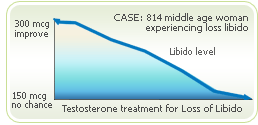Losing your sex drive may be one of the perimenopause symptoms that has the biggest impact.
Suddenly, LOL is no longer Laughing out Loud but Loss of Libido.
Since women’s libidos are strongly affected by intricate interactions of emotional, nutritional and hormonal factors, the solution to Loss of Libido has been more elusive than simply finding the equivalent of Viagra for men.
But researchers have found one substance that has repeatedly shown benefit. In a study published in the New England Journal of Medicine, a group of researchers made some headway in treating loss of libido.
Testosterone, the “male hormone,” controls many sexual functions and desires in women as well as men.
 The year-long study involved 814 middle-aged women who were experiencing loss of libido. The results showed that, on average, women who were treated with a patch that released 300 micrograms of testosterone each day began to lose their loss of libido.
The year-long study involved 814 middle-aged women who were experiencing loss of libido. The results showed that, on average, women who were treated with a patch that released 300 micrograms of testosterone each day began to lose their loss of libido.
Unfortunately, the side effects of this treatment include deepening voice, facial hair growth and acne.
The key to understanding testosterone’s role is knowing that it is manufactured in the body from the same pool of materials as all other steroid hormones. The hormonal imbalance that can occur during perimenopause means your body has to prioritize how to use the building block precursors it has for all steroid hormones.
This means it has to choose between making stress hormones and reproductive hormones.
And in that tug of war – the stress hormone cortisol always wins. The result is that you don’t have enough building blocks for your body to make the estrogen and testosterone it needs for a healthy libido.
Functional Nutrition (which is what I do) uses this research data with a different approach. Rather than adding external testosterone, the Functional Nutrition approach is to address the imbalance of the HPA – the hypothalamic-pituitary-adrenal axis. This means looking for which building blocks are missing so your body can make sufficient quantities of its own hormones – without the nasty side effects.
In my practice in Los Altos, CA I recommend a saliva test called the Adrenal Stress Index which measures cortisol as well as the precursors for estrogen, progesterone and testosterone. Based on the results we then know which specific foods, supplements and lifestyle factors will restore balance and help you feel better quickly
Dr. Mehmet Oz, too, advises the use of natural, holistic methods to treat perimenopause symptoms and the often associated adrenal dysfunction.
A simple step you can take RIGHT NOW is to find out what diet-related factors may be contributing to your symptoms.
Click the button below to take Dr. Rose’s Nutritional Profile Quiz and get an overview of what your nutritional imbalances could be. You’ll get your results immediately.
Image provided by freedigitalphotos.net.

